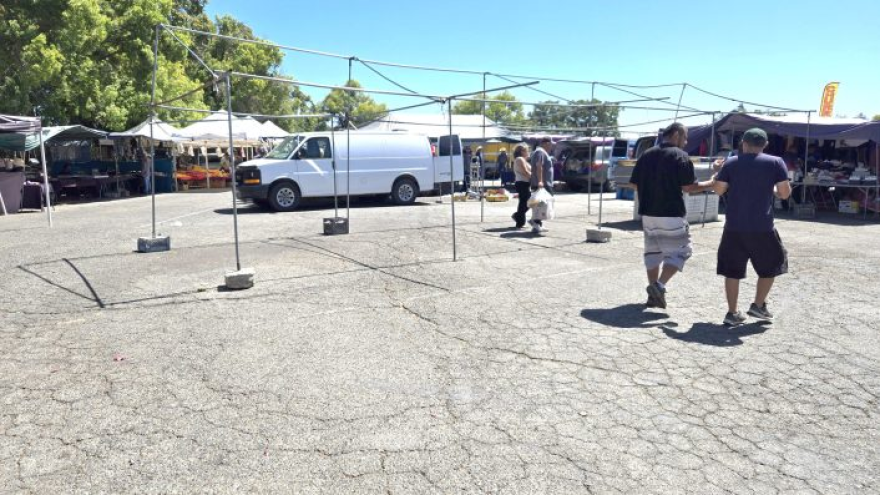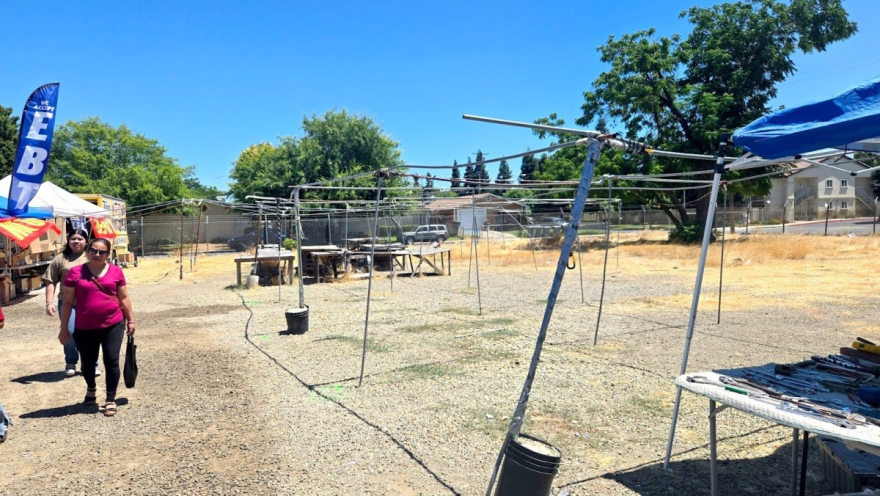This story was originally published by The Merced FOCUS.
One of the Valley’s cash economies already is feeling the economic impact of President Donald Trump’s immigration policies.
While Merced’s farming fields and packing plants appear to be operating as usual, advocates and workers say the more fragile, migrant cash-based economy of the region’s swap meets, colloquially known as “remates,” is showing signs of strain.
Unlike Southern California, there have been no verified immigration raids by federal agents in Merced County thus far. Still, at the Merced and Atwater weekend swap meets, vendors have reported a noticeable decline in foot traffic and sales.
The cause, they say, is fear.
Rumors of immigration enforcement in surrounding areas are enough to keep families away from their weekend routines. Vendors, in turn, see the effects on their bottom lines.
“From the looks of it, it’s not gonna go away,” Merced swap meet vendor Gabriel said about the scarce market traffic. “A lot of people lost their trust in spending money. Now everybody is sitting down, adjusting numbers, putting more money aside in case (something happens).”
A recent UC Merced and Bay Area Council Economic Institute study found mass deportations could strip over $275 billion from California’s economy.
With an estimated 1.5 million undocumented migrants making up 8% of the state’s workforce, researchers warned the impact could have rippling effects.
ICE raids in California stir fear
Migrant communities across California have been gripped by fear and uncertainty following raids in Kern County in January and Ventura and Los Angeles counties in June and July.
A judge issued a preliminary injunction blocking warrantless El Centro Border Patrol operations following “Operation Return to Sender” in Kern County. Los Angeles just joined an ACLU lawsuit challenging Trump’s immigration raids.
In Merced County, there have been no verified raids by Immigration and Customs Enforcement (ICE). Still, local immigration advocates have remained vigilant.
On June 16, residents took to social media with allegations that a man was taken by three masked individuals outside the Merced County courthouse.
Advocates with Faith in the Valley, who operate a rapid response network hotline, were notified when the incident was reported.
Community organizer Blanca Ojeda said she went to the courthouse after hearing an eyewitness account of what happened.
Once at the courthouse, Ojeda saw three men, who she believed to be ICE agents, at the entrance.
The three men stayed in front of the courthouse but did not detain anyone while she was there. Others from her organization showed up and began holding signs.
The men photographed Ojeda’s group before leaving about 30 minutes later.
The Merced County Sheriff’s Office, which provides courthouse security, did confirm with The Merced FOCUS that federal immigration agents were active at the Merced County courts in June. The details and specific dates of that activity remains unclear.
Ojeda said there have been several reports of ICE presence, but none that she has been able to verify.
Empty stalls, less foot traffic
The toll of the rumors is taking root in the county through a quiet withdrawal of a community that no longer feels safe going about daily routines.
At the swap meets in Atwater and Merced, where there once was a lively chorus of sellers and curious shoppers, now there are quiet, dirt-filled corridors with vacant stalls.
Jose and Silvia have made a career selling colorful, economically-priced, dressy women’s looks and gym wear for the last 40 years.
Although the couple is documented and pays taxes, they requested that their last names be withheld out of caution.
The $76-a-day stall they rent every Sunday in Atwater once overflowed with bold fashion finds.
On a recent summer visit, the back of the makeshift storefront stood bare, while the front was sparsely decorated with a few hanging clothes, a couple of mannequins, and two half-filled circular racks.
Jose said sales began to slip in January, but as the summer heat scorched Merced and fear of immigration raids spread through California, the slowdown hit hard and fast.
“De enero pa’ acá, no ha habido nada – since January, we’ve had nothing,” Jose said in Spanish. “We used to have a lot of people. Now we have about 20% to 30% of the people we used to.”
“Desde que entró ese viejo de presidente ha bajado todo – since that man became president, everything has gone downhill,” Silvia added.
The three swap meets they work – Atwater, Merced and Turlock – are their only source of income. Most days, Silvia said, they barely make enough to cover the rent.
The couple, in their mid-60s, said they wouldn’t know what to do if they lost their only place left to work.
“If we weren’t here, we would get sick,” Jose said. “…I would be in the dirt in six months. I use this as therapy – to talk to people.”
Their salvation comes from their three daughters, who Jose proudly said were highly educated and working high-paying jobs in various industries. Each month, they deposit money to help their parents make ends meet.
“They keep telling us to stop coming,” Silvia said. “Most times, we lie to them and tell them we made more.”
They used to spend $30. Now it’s $15
About 10 miles away in Merced, the Saturday stall run by Gabriel and his parents has met a similar fate.
“After they started doing the massive raids, that’s when people started not wanting to go out,” he said, explaining how most of his customers are farmworkers who buy sweets for their children. “They used to spend $30. Now it’s $15.”
Gabriel’s parents are currently going through the naturalization process, and he asked that his last name not be used in this story to avoid any potential complications.
For 20 years, the family satisfied the sweet and savory cravings of their customers with imported Mexican candies and handmade piñatas.
It wasn’t only that customers were staying away, Gabriel said, but vendors were disappearing more and more with each passing weekend.
“The revenue isn’t the same anymore, and our expenses are the same,” he said, adding that they also set up at the Galt and Napa-Vallejo flea markets.
The downturn, Gabriel said, hit hard right after Father’s Day weekend.
“We already had a tariff situation on our backs, and then ICE raids were just going all over the place,” he said.
The severity of the moment forced a family meeting, where expenses and overhead costs were laid bare. They were now bringing in just 70% of what they used to.
“The money coming in is much less,” Gabriel said. “We had to rearrange almost everything. I wouldn’t say it changed our lifestyle, but we’re having to accommodate for future purchases.”
The family used to drive down to Los Angeles each week, partly for business and partly as a form of escape. It’s been over a month since their last trip. Gabriel doesn’t know when they’ll go back, or what the future holds for them.
As for him and his family, Gabriel said he knows there will be some change in the future, and it will probably come “sooner than needed.”
“We’re going to have to start taking other alternatives,” he said.
A citrus seller finds a way through
A couple of rows up, in a section of the outdoor bazaar where fruits and vegetables are sold, stand three long tables, each filled halfway with tangerines, oranges, and plums.
At the front, baskets filled with fruit are neatly arranged, selling at $5 for three pounds.
Beside them, sliced samples of fruit are sprinkled with Tico, a sweet and spicy powder, and topped with chamoy, a sticky, tangy syrup.
The man in charge said his family is navigating the immigration system and wanted to remain anonymous to avoid any hiccups in the process.
Like many others in the Valley, after arriving in the U.S., he started working in the fields, then picked up work in construction and landscaping to support his family.
It was his long history of sales in his native country that led him to the hustle in citrus sales, which turned into a nearly 20-year career.
Things have changed, he said. He remembers when he had to show up in the middle of the night just to claim a spot to sell, or wait years to get more space.
“Sometimes I would sleep in the parking lot,” he said. “I used to work all days of the week since my children were younger and would help me out.”
These days, he works three swap meets a week, in Merced, Atwater and Turlock.
He uses two days of the week to purchase crisp merchandise to sell and the other two to rest and spend time with his family.
Whether it’s because of the freshly-picked fruit or the necessity of food, his business hasn’t taken the same hit as others.
“It looks slower, but we have not been affected as much,” he said. “We sell something basic – food. We sell about the same, but you can tell, there are fewer vendors and less shoppers.”
As long as he sells enough to pay the bills, eat, and keep a roof over his family’s head, that is enough.
“We’re not chasing riches anymore,” he said. “We just want to survive.”
That sense of quiet resilience, however, doesn’t cancel out the fear that continues to echo through conversations among vendors and customers alike.
Silvia and Jose have heard the rumors, but they haven’t witnessed any immigration raids themselves or had any friends or family members detained.
Gabriel said his customers from Napa, Vallejo and Santa Rosa often bring news of worsening conditions in the fields, but no reports of raids.
Although his parents are cautious when going out while working toward formal U.S. citizenship, Gabriel said his family hasn’t been affected by raids, nor have they seen anyone they know get picked up.
“They’re really scared of what’s going on, and the news doesn’t make it better,” he said.
And while fear drives who shows up and how money moves, vendors say it’s not just immigration crackdowns rattling the circuit – it’s also trade policy.
Tariffs and the cash economy
Gabriel, Jose and Silvia all sell imported products. They said that when the talk of tariffs started circulating, their suppliers became scared and made hasty decisions.
One of Gabriel’s main vendors, who brings candies strictly from Tijuana, closed down for two months to figure out what kinds of tariffs they would face.
“We were running pretty low on stock,” he said. “Other people would have them, but they would have them damn near double what we got them for.”
The pricing eventually evened out, allowing Gabriel to get his Mexican merchandise without too steep a price tag.
However, the material used to make their handmade piñatas comes from China, straining their bottom line.
“We’re getting hit with a couple of different scenarios,” said Gabriel. “If it’s not tariffs, ICE raids. But if it’s not ICE raids, there’s no jobs.”
Jose and Silvia haven’t been as fortunate. It’s been four months since they last restocked.
“What I have left, I got from someone who went bankrupt,” Jose said. “They sold it to me for $1 a piece.”
Jose said they would keep going until they ran out of clothes. Then, they would stop.
“As soon as we finish what we brought, we’re done,” he said, admitting that if conditions were to change, they would continue their vending. “This is no longer a business. We’re going into our pockets each time we set up.”


